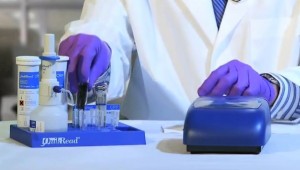C Reactive protein test helps in evaluating the level of inflammation in the body. The test will usually reveal a very low value under normal conditions, and any deviation from the normal values indicates that there is inflammation in the body. The Creactive protein test may not be capable of pointing out the location of the inflammation as well as the disease causing it, but it is an effective tool in establishing the presence of an illnesses.
The C reactive protein (CRP) test may be used along with other tests to diagnose certain diseases. People with abnormal levels of C-reactive protein tend to be suffering from infection and other chronic diseases and the CRP test helps in assessing the effectiveness of the treatment employed.

What is C-reactive protein test?
Creactive protein test is a diagnostic test that specifically measures the levels of C-reactive protein in the body. The C-reactive protein refers to a type of protein that is produced by the liver whenever an inflammation occurs in the body. It is present in the bloodstream when there is tissue damage and more often, at high levels.
For what is the C reactive protein test used for?
The test generally measures the level of inflammation in the body as the C reactive protein is found in high levels when a person is suffering from chronic diseases and infections of certain kinds. The CRP test does provide information with regards to the concentration of the C-reactive protein present in the blood. C reactive protein test is used for a number of purposes, and these are:
- Checking for infection following a surgical procedure. The levels of C-reactive protein are normally high between 2 and 6 hours of surgery, and lessen on the third day. But if they remain high after 3 days, then an infection has likely occurred.
- Figuring out and tracing diseases and infections causing the inflammation, such as lymphoma (or lymph node cancer), osteomyelitis (a bone infection), inflammatory bowel disease, rheumatoid arthritis, autoimmune diseases and painful inflammation of blood vessels in the neck and head.
- Assessing the effectiveness of the treatment procedure done on the patient. The treatment method is said to be working if the levels of C-reactive protein normalize quickly when the treatment procedure is given.
Aside from the typical C reactive protein blood test, people who are at high risk of developing heart diseases or heart attacks will be tested using a special kind of C reactive protein test which is called the High-sensitivity CRP test (or hs-CRP). This is because an inflammation can harm the lining of the arteries making heart attack more likely to occur.
Who needs to get tested with C reactive protein test?
Physicians normally request the C reactive protein test or the hs-CRP test to patients who exhibit symptoms of the following medical conditions:
- Certain types of arthritis
- Pelvic inflammatory disease
- Inflammatory bowel disease
- Coronary heart disease
- Autoimmune diseases
- Cardiovascular disease
The test may not provide specific details about certain diseases that cause the inflammation but it does help physicians to conduct further tests to determine the underlying cause and tailor the appropriate treatment plan.
How is the C reactive protein test done?
The test involves drawing a small amount of blood from the patient which is brought to the testing lab for evaluation. The procedure is done by:
- Wrapping the upper arm with an elastic band to stop the blood flow, making the veins beneath the elastic band grow larger.
- The site of the upper arm will be cleaned with alcohol, and a needle will be inserted into the vein.
- A small amount of blood will then be collected in a small tube and the needle and elastic band will be removed, covering the injection site using a bandage.
The test rarely causes any risks, and if it does, some of these are infection, hematoma, lightheadedness, fainting and excessive bleeding.
Are there factors that may affect the result of C reactive protein test?
Certain conditions can distort the result of the C reactive protein blood test, and these are:
- Pregnancy
- Obesity
- Infection
- Presence of intrauterine device (IUD)
- Recent exercise or physical activity
C reactive protein test results
Although the normal range of C-reactive protein differs from one laboratory to another, the standard normal range falls from 0 to 1.0 mg/dL, or not greater than 10 mg/L. Meanwhile, the hs-CRP normal range is below 1.0 mg/L. An elevation of these values signifies that there is an inflammation.
What does a positive C reactive protein blood test result indicate?
A positive or elevated CRP blood test reveals the presence of inflammation in the body due to certain medical conditions such as cancer, tuberculosis, rheumatic fever, connective tissue disease, lupus and inflammatory bowel syndrome, to name just a few.
The C reactive protein test is an important diagnostic test that will confirm the presence of inflammation in the body. This helps physicians conduct other tests to identify the underlying cause of inflammation and assess whether a treatment is working or no
Hi my friend! I wish to say that this post is amazing, nice written and include approximately all significant infos. I would like to see more posts like this.